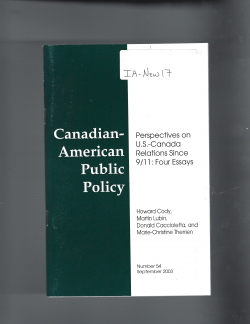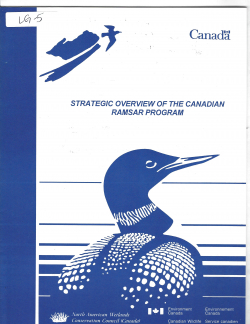Canadian-American Public Policy: Perspectives on U.S - Canada Relations Since 9/11: Four Essays

Buy online ($)
Type
Book
Authors
HCody ( Howard Cody )
MLubin ( Martin Lubin )
DCaccioletta ( Donald Caccioletta )
MCTherrien ( Marie-Christine Therrien )
ISBN 10
1882582438
ISSN
1047-1073
Category
SCIWC Library
[ Browse Items ]
Publication Year
2003
Publisher
University of Maine - Canadian-American Center , United States
Pages
79
Subject
Canadian and American relations post 9/11
Tags
Abstract
"To our readers
Someone once said that periods of history exist only in books. What he meant is that the forces generating continuity and change are rarely self-evident in the stories of individuals or nations. Rather, scholars shape their chapters by making sometimes arbitrary decisions about when a certain era or theme started or drew to a close, often marking them by 'turning points' -- that is, by specific events that they believe to have 'changed the course of history'. Since September 11, 2001, images generated by the crash of two jetliners into the World Trade Center towers have provoked millions into pondering the extent to which these horrific events may have ushered in a new era of global history. Only time will tell..., but when? Many years ago Frederick Jackson Turner observed that each generation interprets that past in the light of conditions uppermost in its own time, and so it is probably true that future generations will understand '9/11' differently from those of us who first saw it 'live' on TV two years ago, and subsequently in countless re-runs.
Similarly, students of the 49th parallel are wondering if the events that generated the 9/11 attacks will mark a significant turning point in the U.S-Canada relationship. To that end, a symposium on 'U.S. - Canada Relations since 9/11", jointly sponsored by U. Maine's Canadian-American Center and Plattsburgh (NY) State University's Center for the Study of Canada, was held at Buchanan Alumni House on the campus of the University of Maine on May 22, 2003. The impetus for this event came from the International Office of the U.S Department of Education, an agency that administers the National Resource Center and foreign Language and Areas Studies fellowship programs and funds the Northeast Consortium on Canada. The Office was responding to a request from Congress for the higher education international community to study the post-9/11 situation. Although the symposium was born in the immediate aftermath of 9/11, it required a year to obtain funding to put it on, provoking a decision to broaden the focus in order to take into account the impact of the rapidly changing post 9/11 global political landscape. As a result the authors are able to situate recent events within broader patterns of U.S-Canada interaction and contribute to the ongoing debate about whether or not 9/11 is likely to mark a major turning point in the relationship."
Someone once said that periods of history exist only in books. What he meant is that the forces generating continuity and change are rarely self-evident in the stories of individuals or nations. Rather, scholars shape their chapters by making sometimes arbitrary decisions about when a certain era or theme started or drew to a close, often marking them by 'turning points' -- that is, by specific events that they believe to have 'changed the course of history'. Since September 11, 2001, images generated by the crash of two jetliners into the World Trade Center towers have provoked millions into pondering the extent to which these horrific events may have ushered in a new era of global history. Only time will tell..., but when? Many years ago Frederick Jackson Turner observed that each generation interprets that past in the light of conditions uppermost in its own time, and so it is probably true that future generations will understand '9/11' differently from those of us who first saw it 'live' on TV two years ago, and subsequently in countless re-runs.
Similarly, students of the 49th parallel are wondering if the events that generated the 9/11 attacks will mark a significant turning point in the U.S-Canada relationship. To that end, a symposium on 'U.S. - Canada Relations since 9/11", jointly sponsored by U. Maine's Canadian-American Center and Plattsburgh (NY) State University's Center for the Study of Canada, was held at Buchanan Alumni House on the campus of the University of Maine on May 22, 2003. The impetus for this event came from the International Office of the U.S Department of Education, an agency that administers the National Resource Center and foreign Language and Areas Studies fellowship programs and funds the Northeast Consortium on Canada. The Office was responding to a request from Congress for the higher education international community to study the post-9/11 situation. Although the symposium was born in the immediate aftermath of 9/11, it required a year to obtain funding to put it on, provoking a decision to broaden the focus in order to take into account the impact of the rapidly changing post 9/11 global political landscape. As a result the authors are able to situate recent events within broader patterns of U.S-Canada interaction and contribute to the ongoing debate about whether or not 9/11 is likely to mark a major turning point in the relationship."
Number of Copies
1
| Library | Accession No | Call No | Copy No | Edition | Location | Availability |
|---|---|---|---|---|---|---|
| SCIWC Administration | 13044 | IA-New17 | 1 | Yes |




